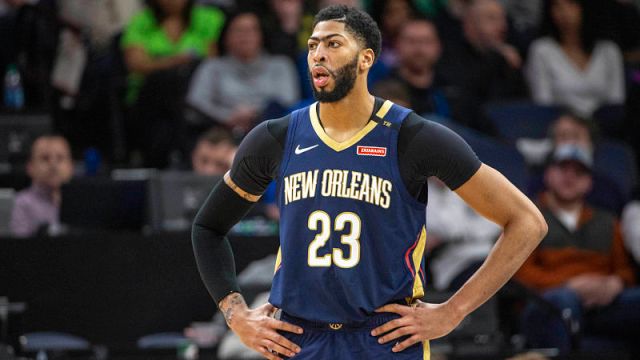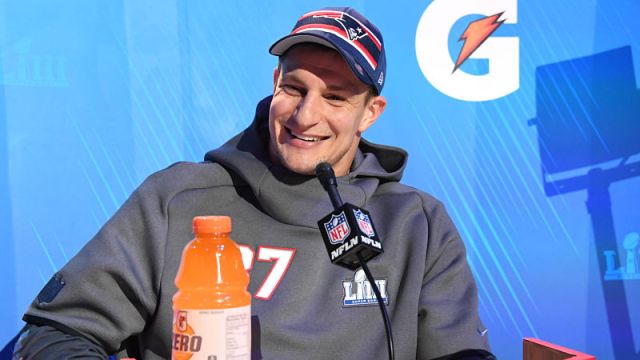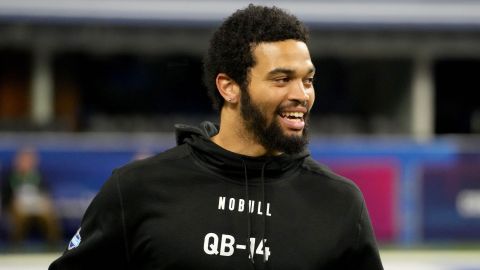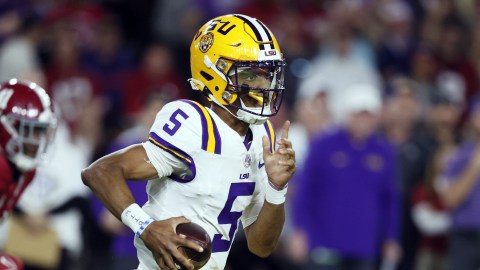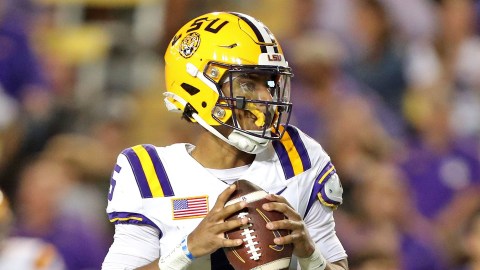ATLANTA — The New England Patriots’ starting cornerback corps could have formed to make a pretty dangerous offensive trio on Friday nights. But let’s just say there’s a reason they changed to the defensive side of the ball by the time they made it to college.
Stephon Gilmore, JC Jackson and Jason McCourty all were known more for their offensive prowess than their defensive play during high school. Players talented enough to make the NFL regularly play both ways in high school, and coaches tend to prioritize their offensive snaps.
Gilmore was named South Carolina’s Mr. Football for his quarterbacking skills as he led South Pointe High School to a 15-0 record and state title as a senior. He also played cornerback but was frequently taken off the field to stay fresh on offense.
Jackson played wide receiver and cornerback in high school, but he brags more about his offensive abilities. He caught 133 passes for 3,109 yards with 31 touchdowns during his career at Immokalee HS. He’s said numerous times this season he was an All-American wide receiver, but he actually played defensive back in the Under Armour All-America Game in 2014.
McCourty played running back and defensive back at St. Joseph Regional High School in Montvale, N.J. He carried the ball 94 times for 1,083 yards, caught 15 passes for 407 yards and had 25 total touchdowns as a senior.
Then all three players switched to cornerback in college.
STEPHON GILMORE
Gilmore’s father made the choice for him. But Gilmore knew, despite his ability to lead a high school offense, his NFL future was at cornerback. So, that’s why he made the switch upon enrolling at the University of South Carolina.
“I feel like you can name a lot of 6-1 receivers, 6-foot receivers,” Gilmore said. “There’s not a lot of 6-1 corners who can run, play off, press. I just wanted to do the opposite and go somewhere that’s more challenging and more fun.”
Former South Carolina defensive coordinator Ellis Johnson, who recruited Gilmore, believed Gilmore could have played wide receiver or running back in the NFL, but certainly not quarterback. Gilmore clearly made the right choice to focus on defense once he got to college.
“You see it a lot with the kids who are playing quarterback, and if they’re really great athletes, they all want to continue to play that position,” Johnson told NESN.com over the phone in his South Carolina drawl. “But just in reverse of what I talked about with him, he was somehow smart enough or perceptive enough to see that he didn’t need to waste time playing a position he couldn’t play after college and maybe couldn’t even play in college.
“You just see so many of these kids, they won’t give up on it, and after about a year or two, they end up getting beat out by somebody, and they want to transfer or they end up having to end up moving positions because they’re not going to be able to play there. You’ve got to be able to throw the ball unless you go to a service academy or something. You have to be able to throw the ball to be a good college quarterback.”
Gilmore was unbelievably motivated from an early age. As a sophomore in high school, South Pointe lost 6-3 to Clover High School. That game 12 years ago was a turning point in Gilmore’s life.
“I wasn’t lifting weights as hard,” Gilmore said. “I don’t think I was taking it as seriously. I said, ‘I don’t ever want to feel like that again. So, ever since then I just worked hard and never got complacent and if I did good, just do more. If I didn’t do so good, I’d use that as motivation to get better.”
Gilmore left high school early because he didn’t want to stay at home.
“For what?” Gilmore asked. “I had a scholarship to go to school and get better and go to class, get ahead in class. Why not?”
Johnson met Gilmore when the future cornerback was just 17 years old.
“He was a like a 30-year-old man when I met him,” Johnson said. “His focus, his maturity, his ambitions, his goal setting, his discipline habits, his study-habits. Everything about him, if I had had half the level of maturity he did, I would have been a better man.”
Because Gilmore left high school early for South Carolina, he was able to train through the winter, spring and summer with the team. He earned a starting role Week 1 in his freshman season.
JC JACKSON
The permanent switch to defense was all about body type for Jackson, who chose to play at the University of Florida as a cornerback, though he had an offer from Florida State to play wide receiver.
Former Florida defensive backs coach Travaris Robinson, who’s now defensive coordinator at South Carolina, didn’t feel like Jackson was built to be a wide receiver and was unsure of his longterm staying power as a running back. So, Jackson was convinced to make the switch.
“I feel like corner, I’d last longer in the league playing corner,” Jackson said. “I felt like I was going to be a better corner in college than a receiver.
“But I think if I had played receiver, I would have still been good, man. Coming out of high school, you played everything — receiver, corner. I was just an athlete coming out of high school. But as soon as I got to Florida, they moved me to DB, and that’s when I took over from there.”
Gilmore went in the first round. Jackson was undrafted, but that was despite his play. Jackson had to transfer from Florida after being charged with armed robbery. When he was found not guilty, Jackson spent half a season at Riverside City College before going to the University of Maryland. Character concerns made NFL teams wary, so after he didn’t hear his name called in the 2018 NFL Draft, Jackson signed with the Patriots. Eleven games into his rookie season, Jackson earned a starting role.
“When we got JC, we had Vernon Hargreaves, we had Brian Poole, we had a bunch of guys there and to be quite honest with you, JC was the most athletic guy we had,” Robinson said. “I knew from an athletic standpoint that he could match up with anybody in the world. It was just the concept, the grasp and everything and adjusting high school and college. He was a little immature early. But from an athletic standpoint, he was as good or better than all of those guys that we had, and we had a bunch of first rounders and a bunch of guys playing in the National Football League.”
JASON McCOURTY
McCourty has forged a 10-year NFL career at cornerback. He didn’t switch to safety like his twin brother, Devin, and has become a defensive mainstay in his first year with the Patriots.
He played nearly every down in high school as a running back and cornerback. The only time he came off the field was when he cramped up. His reason for picking defense was simple.
“Nobody wanted me to play running back,” McCourty said laughing. “Coming out of high school, I was about 155 pounds, so that probably wasn’t the ideal position for me. I had got offered from Kent State to play receiver. I didn’t really want to play receiver. I always played DB and running back, so I was totally fine with playing DB.”
He could have formed quite a battery with Patriots wide receiver Julian Edelman, who played quarterback at Kent State.
“I’ll pass on the Golden Flashes,” McCourty said laughing.
That wasn’t the only barb he threw.
“Dev played a little bit of receiver, just wasn’t that good,” he said.
Maybe that’s why he moved to safety.

